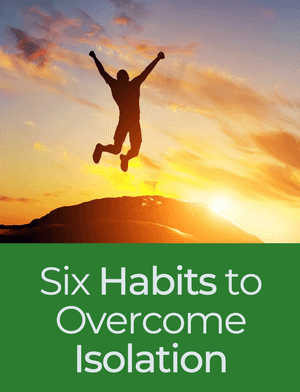
Get the Six Habits for Overcoming Isolation Guide for free


Growing up, you were probably told that you could do, have, and be everything you wanted when you got older. Now that you've reached the adulthood you coveted as a child, are you doing, having, and being everything you've ever wanted? Or did you revise what you define as "everything" somewhere along the way?
Listen to the podcast version here
The average American is $58,604 in debt, 17 pounds overweight, watches 33 hours of TV a week, reads only four books a year, consumes 11 alcoholic drinks a week, exercises only 17 minutes a day, and has less than one close friend.
None of those statistics may apply to you, but my point is that we have been domesticated by society to conform to certain behaviors and thought patterns that result in misfortune.
I know from personal experience that loneliness comes from feeling disconnected, and we feel disconnected because of that domestication - we aren't in touch with who we really are, and so we wake up in despair.
In 2016 I hit my first true rock bottom. At the time, I was stationed at Scott AFB in Illinois as an Air Traffic Control trainee. I had been reassigned there after quitting an AFSOC pipeline a few months prior, and I was barely hanging on by a thread due to my depression; I believed with every fiber in my body that I was useless.
My training wasn't going so well either. Some days I would crush it, and on others, I made mistakes big enough to set me back for weeks. I wasn't very well liked either, partially because I had a terrible attitude and partially because of small-mindedness in regards to my Dutch heritage. I wasn't accepted; I was merely tolerated, and my attitude wasn't helping me.
My big realization came when I was put under EDIT (Experiencing Difficulty In Training) and was forced to work from 6 am to 6 pm six days a week. At the time, I enjoyed working out in the evening, but this was no longer a possibility. Blowing off steam at the gym was a requirement for my sanity, so I endeavored to set my alarm for 4:15 in the morning, enabling me to exercise before my shift.
Once I got accustomed to waking up and working out early, I never really looked back. I felt invigorated instead of lethargic, and I was able to take criticism better. I walked into work feeling mentally strong; waking up early was now a part of my identity, and the early foundation for a morning routine was formed.
Most of us wake up to the incessant beeping of an alarm because somebody else expects us to. Think about it, do you get out of bed because you want to, or do you delay waking up until you have to? It isn't your own choice to wake up, so you rebel by hitting the snooze button one more time. We start our days not with purpose but with a sense of obligation.
Most people would give you a blank stare if you asked them, "what is your purpose?". Many of us take life one day at a time and have no higher purpose beyond surviving. To defeat that dreadful morning feeling, you need a purpose in life, something worth waking up for. For example, my goal in life is to inspire, which is why I am writing this blog.
The first thing you think about in the morning is usually the last thing you thought about before going to bed. You may have had thoughts like, "I have to get up in six hours for a team meeting; I'm going to be exhausted when I wake up!", and you probably were.
The key is to consciously create a positive expectation for the next morning, like those nights when you could barely fall asleep because you were so excited about waking up the following day to start a new job or go on vacation. Therefore, the first step in debugging the snooze problem is by setting your intentions for the morning before going to bed.
In order to prevent yourself from being tempted to keep snoozing, move your alarm (or phone) as far away from your bed as possible. It doesn't matter where you put your alarm, what's important is that it's far enough away for you to be able to resist going back to bed by the time you turn it off.
After getting out of bed, the first thing you should do is drink a full glass of water. Research has shown that doing so aids in weight loss, increases mental clarity, and boosts your mood. I have been doing this for a few years now, and I feel significantly different on the days I don't.
Finally, in order to transition smoothly into your morning routine, you should get dressed in activewear. This will signal your subconscious you are ready to begin the work. It may sound overly simplistic, but it's the easy habits like these that build momentum in the direction of your choosing.
Now that we've covered why we have trouble waking up without hitting the snooze button, let's explore the activities I have found to be most helpful. A morning routine is centered around the idea that spending time on yourself first thing in the morning grounds you in clarity and meaning, which you carry with you the rest of the day, resulting in more confidence and a higher sense of accomplishment.
Journaling is a form of therapy that doesn't cost you anything but a few minutes of your time. By transferring the thoughts from your head to words on paper, you gain valuable insights you wouldn't see otherwise. Where you record your thoughts and for how long you write isn't as important as documenting your insights, ideas, milestones, and lessons learned in a retrievable medium. You will be amazed by your writing and the insight you gain when you read it back sometime later.
To live each day with the peace and clarity that will allow you to stay focused on what's important to you, start every morning in silent meditation. Studies have shown meditation offers many benefits against an array of both physical and mental conditions such as IBS, anxiety, depression, and PTSD.
Your behavior is determined by your personality, and your personality is a snapshot in time of your identity. Your identity consists of the collection of core beliefs you have about yourself. Therefore the answer to the question "who am I?" is simply "whatever you believe yourself to be".
Most of your core beliefs aren't your own, they were imprinted on you. Ask yourself if the beliefs you have about yourself are true and whether they are serving you. If they aren't, affirmations allow you to reprogram them in order to design and develop the thoughts, beliefs, and focus that you need to live an authentic and fulfilling life.
The benefits of exercise have been well established. Exercising every morning noticeably improves physical and mental health, and enables you to think with more clarity and focus longer.
You don't have to spend an hour doing strenuous High-Intensity Interval Training. The idea is to get fresh blood circulating to your brain and tissues. My personal favorite is doing 15-30 minutes of yoga, but you can start even easier. Simply getting in the habit of doing one minute of exercise will set you up for a better life.
The key to growth is learning from those who have already done what you want to do. With an almost infinite amount of books, there is no limit to the amount of knowledge you can gain through reading.
You don't have to spend all of your days reading. If you read ten pages every day, which may only take about ten minutes, you will have read 3,650 pages in a year, totaling an average of 12 books. How much more knowledgeable and capable would you feel if you read 12 books a year?
Let's say you currently set your alarm for 8:15 am, and you snooze it as soon as it goes off. You stroll out of your warm, comfortable bed at 8:30 and barely have time to collect yourself before the standup meeting at 9 am. You feel rushed, clouded, and exhausted. What would your day have been like if you had woken up 30 minutes earlier and spent that time on yourself? How much more clarity would you have, and how much better would you feel?
Here is an example schedule you can try:
08:00 Wake up, drink a cup of water, and journal about gratitude and intentions for the day (try this)
08:05 Meditate for five minutes (try this)
08:10 Yoga for ten minutes (at-home option)
08:20 Read ten pages (great option)
08:25 Recite and visualize affirmations (read here)
Feel free to adapt it to whatever suits your needs; it doesn't have to be a major commitment right away. Start simple, slow, and easy. Once you've adjusted to the structure of your routine, you can start increasing the amount of time you spend on each activity. I would love to hear about your experiences, so give it a try and let me know how it works for you!
If you believe this information can benefit anyone you know, please don't hesitate to share this blog post. You can also sign up for my newsletter on the bottom of this page to receive blog updates (never spam), and you will receive the 2022 React Developer Roadmap for free.

Get the Six Habits for Overcoming Isolation Guide for free